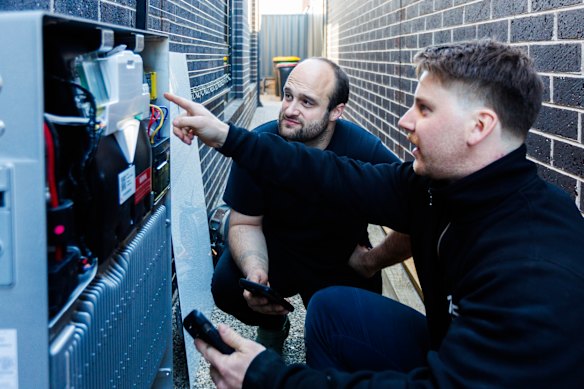
Demand for household batteries is experiencing a significant surge in Australia, driven by the Albanese government’s national rebate initiative. Retailers have reported a fourfold increase in sales and inquiries since the scheme’s commencement, marking a pivotal moment in the country’s solar energy landscape. However, experts caution that while investing in a battery can substantially reduce annual power bills, the financial returns may not be immediate.
The Cheaper Home Batteries Program, a cornerstone of the government’s election promises, offers a 30 percent rebate on the purchase and installation costs of home batteries from July 1. This initiative aims to accelerate the adoption of battery storage systems among Australian households, particularly those already equipped with solar panels.
Rising Demand and Market Response
According to SolarQuotes, a quote-comparison service owned by Origin Energy, there has been a notable spike in battery inquiries leading up to the scheme’s launch. Chris Zondanos, Origin’s general manager of electrification, highlighted the trend, stating,
“The volume for May was 400 percent higher than the previous month, and about two-thirds of all quote requests are now for home batteries.”
The program is primarily available to homes with existing solar panels, but it also extends to those willing to install both panels and a battery simultaneously. This flexibility is expected to further boost the uptake of the program, considering that solar panels are already installed on 4 million out of 11 million homes across the nation. However, only 250,000 of these currently have battery storage.
Industry Insights and Consumer Considerations
Battery installation companies like 1komma5 have been proactive, offering discounts to customers even before the government scheme officially started. This strategic move allows them to claim the rebate from the government, effectively passing the savings onto consumers.
Allan Lancaster from Truganina, Melbourne, is among the many Australians considering the investment. With the assistance of battery installer Haidyn Boothey from 1komma5, Lancaster is evaluating the potential long-term savings against the upfront costs.
Experts in the field emphasize the importance of understanding the financial implications. While the rebate reduces initial expenses, the return on investment depends on various factors, including energy consumption patterns and future electricity prices. Consumers are advised to conduct thorough research and possibly consult with financial advisors before making a decision.
Historical Context and Future Implications
The current surge in battery sales is reminiscent of the solar panel boom experienced in Australia over the past decade. As technology advanced and costs decreased, solar panels became a common feature on rooftops nationwide. The integration of battery storage is seen as the next logical step in maximizing the benefits of solar energy.
Looking ahead, the widespread adoption of home batteries could significantly alter the national energy grid. By enabling households to store excess solar energy, batteries can reduce reliance on the grid during peak times, potentially leading to more stable and sustainable energy systems.
As Australia continues to embrace renewable energy solutions, the Cheaper Home Batteries Program represents a critical step toward a more sustainable future. The government’s commitment to supporting this transition underscores the growing recognition of renewable energy’s role in addressing climate change and enhancing energy security.
In conclusion, while the immediate financial benefits of installing a home battery may vary, the long-term implications for both individual households and the broader energy landscape are profound. As the program unfolds, its impact will likely extend beyond economic considerations, contributing to a cleaner, more resilient energy future for Australia.






